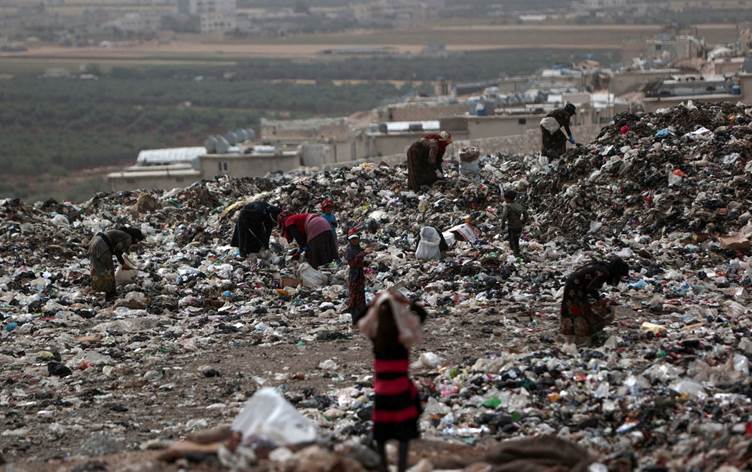
In this picture taken on June 3, 2023, women and children sift through rubbish, as they look for plastic items to sell for recycling, at a dump site near the village of Hazreh in Syria's northwestern Idlib province. Photo: Aaref Watad/AFP
ERBIL, Kurdistan Region - The European Union pledged 560 million euros ($600 million) for countries neighboring Syria hosting displaced Syrians, foreign policy chief Josep Borrell said on Thursday.
Speaking at a conference in Brussels for “Supporting the future of Syria and the region,” Borrell said that “little progress” had been made over the past year towards the end of the conflict in Syria, saying that it is “unacceptable that Syria has been brought so low.”
Borrell stated that the renewed pledge for aid would be for the Syrian people, not for the regime in Damascus which he blamed for the “decades of suffering” endured by those in Syria.
The conference is aimed at ensuring the continuation of support to Syrians in the country as well as those outside, working towards a political resolution to the conflict in line with UN Security Council 2254, and to provide support in the aftermath of a devastating earthquake that struck the north in February.
The seventh annual conference comes amid a normalization of ties between countries in the Middle East and Syria’s President Bashar al-Assad. In May, Damascus was readmitted back into the Arab League after being expelled when the civil war erupted in 2011. Turkey, who has supported the rebels against Assad, has also being working towards a rapprochement with Syria.
Borrell stated that despite the recent regional developments to mend ties with Assad, this was “not the path chosen by the EU.”
The head of the EU delegation to Syria, Dan Stoenescu, told Rudaw’s Znar Shino on Wednesday that it was important to “support Syrians in regime-controlled areas, in the northwest, in the northeast, and those in the diaspora.”
Stoenescu added that the conference was aimed at showing support and pushing for “a Syria where Syrians want to come back and not to leave…unfortunately we are not at that point.”
In a video address, UN Secretary-General Antonio Guterres said that the “suffering of Syrians defies description.” He added that over 12 million people had been “forced from their homes” and that “nine in 10 Syrians live below the poverty line” while over 70 percent require humanitarian aid.
Iraq’s Minister of Foreign Affairs, also present in Brussels, told Rudaw that Europe had “become captives of their own words” for calling for the removal and prosecution of the Assad regime. “They are caught in a dilemma as they do not know how to deal with the Syria situation,” he said.
Syria’s civil war began in 2011 when anti-government protestors demanded democratic reforms but the demonstrations quickly escalated into a violent conflict that has left hundreds of thousands of people dead and left large parts of the country in ruins. The UN Security Council Resolution 2254, which was adopted in 2015 in an attempt to work towards peace in the country.
Around 5.5 million Syrian refugees live in neighboring Lebanon, Jordan, Turkey, Iraq and the Kurdistan Region, as well as Egypt.
There are over 246,000 Syrian refugees in the Kurdistan Region according to the latest data from the Kurdistan Regional Government’s (KRG) Joint Crisis Coordination Centre.
“You cannot close your doors on them. They are running away from starvation,” Hussein said.
The twin earthquakes on February 6 had their epicenters across the border in Turkey. In Syria, they killed more than 6,000 people, made millions homeless and vulnerable to diseases in areas that were already suffering after 12 years of conflict.







Comments
Rudaw moderates all comments submitted on our website. We welcome comments which are relevant to the article and encourage further discussion about the issues that matter to you. We also welcome constructive criticism about Rudaw.
To be approved for publication, however, your comments must meet our community guidelines.
We will not tolerate the following: profanity, threats, personal attacks, vulgarity, abuse (such as sexism, racism, homophobia or xenophobia), or commercial or personal promotion.
Comments that do not meet our guidelines will be rejected. Comments are not edited – they are either approved or rejected.
Post a comment